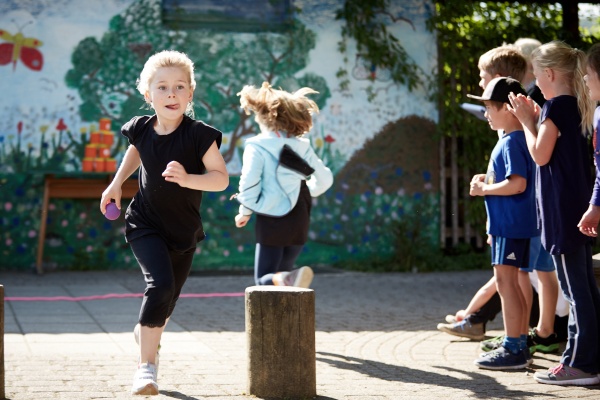Fair city sharing - what can urban planning contribute?
Our cities have grown over centuries. This also reflects the history of urban society, i.e. who was in charge, which professions were accessible to whom. A city is a multi-layered structure:...


YOUR FORUM FOR PLAY, SPORTS UND LEISURE AREAS

Getting out of breath when jumping around in sacks, training your throwing arm when throwing cans and balancing yourself with the cup-stacking game "Stacking": What makes kids, teachers and parents at primary and special schools move? It is the fit4future action day with many exercise stations and even more fun.
fit4future Kids is the health and prevention initiative of the Cleven Foundation and the German health insurance company DAK Health. It supports primary and special schools by positively and sustainably influencing the habits of 6 to-12-year old pupils and in transforming schools into a healthy living environment. Four modules form the basis of the holistic and scientifically evaluated initiative - physical activity is one of them. As numerous studies have shown, moving and healthy children are more motivated and more concentrated in the classroom.
fit4future Kids - the programme of the health and prevention initiative
The Cleven Foundation has been implementing the large-scale project fit4future Kids since 2005. In 2016 DAK Health was added as an important competence partner. Since then 600,000 pupils at 2,000 schools throughout Germany have been involved in the free-of-charge programme.
The programme is of course not limited to a single day of action. The project duration of the fit4future Kids initiative is three years. It starts for all participating schools by mainly focusing on the topic of exercise in the first programme year. Thus, exercise will be integrated as an essential part of everyday school life. This is fit4future's response to studies showing an urgent need for action: According to the Child and Youth Report of DAK Health from 2018, every fourth child is chronically ill. Doctors are increasingly diagnosing back pain or obesity. Five percent of children between the ages of nine and thirteen are already overweight. Other studies show that four out of ten children cannot somersault when they start school and that 65 percent of children suffer from poor posture. It is about time to change this!
"Children spend most of their time at school. It is important that they are motivated to become physically active and have fun doing exercise. In this way, both the lack of exercise and obesity can be counteracted while at the same time the children's concentration can be promoted," says Dr Hans-Dieter Cleven, founder of the Cleven Foundation. Accordingly, the fit4future Kids' programme starts directly in the school setting and involves the teachers and pedagogical staff as well as the children at the participating schools. The aim: to support the schools in continuing their sustainable development towards a healthy and independent school to that effect, even beyond the programme closure. Achieving this objective will be helped by both brochures and digital content, fit4future area managers as advisors and contact persons for teachers and the training of teachers as so-called fit4future teacher coaches, who will take care of the implementation at their schools. The four modules of the programme are exercise, nutrition, brain fitness and relationship prevention.
Integrating exercise into everyday school life - the so-called fit4future play bin
It is bright orange, big and full of surprises: At the beginning of the programme, every participating school will get a fit4future play bin. It contains twenty different, pedagogically valuable sports and play equipment, all of them certified by the technical inspection agency, from skipping ropes and moonhoppers, to Rola Bora boards and stilts, to frisbee discs, skateboards and much more. There is something for everyone so as to guarantee fun and action-packed breaks or sports lessons.
There are also action cards in the game bin. The play and exercise ideas on the cards give the children new incentives and ideas on how to use the equipment and let off steam. The cards, which have been specially designed for children, were developed in cooperation with the Department of Sports, Physical Activity and Health at the University of Basel and in collaboration with the Technical University of Munich. The cards and the ideas represented on them are assigned to popular themes such as the zoo or outer space, for example:
After the pupils have come to know the materials in class, they are supposed to be used in the playground, in (sports) lessons or in afternoon supervision. To ensure that all classes really benefit, a rotation procedure could be established. In this way the whole school can benefit from fit4future.
The highlight of the programme: the fit4future action day
Each school will have its own fit4future Kids action day. On this day, the whole school and all classes - as well as the parents - can jointly experience the fit4future programme meaning: "It's very special, the whole school comes together and participates and all children are beaming," a primary school teacher happily reports during the action day. Another one joins in: "The action day is a real highlight. The children were particularly looking forward to showing their parents how fit they had become in terms of sports and mental fitness".
fit4future head coach Michael Randl, who organises and carries out action days at the schools, explains in more detail what the participants can expect on such action days: "On the fit4future action day we will transform the school, the gym and the classrooms into a sports and exercise course. There are different stations. Each class will have to go through every station which encourages a certain competition spirit. The children form teams. They should give it everything they can and be motivated. We address the modules of our project with the different stations: exercise, nutrition and brain fitness."
The exercise stations are a lot of fun for children and adults. Those who can't get active themselves are cheering on the teams which will be formed by the pupils themselves. The day of action is also a highlight in winter: then the stations are simply adapted to winter sports. In addition to ice floe hopping (four small mats that serve as floes while the ground represents the ice-cold water), a biathlon of sack race and can throwing is offered. While skiing with tandem skis, the kids can show how well they work together in teams of two.
Out of breath and with red cheeks, one primary school pupil happily reports his experience afterwards: "The action day was real fun. And we are very proud of our success. An enthusiastic mother reports: "We had a girl who said: 'I can't do it any more, I can't do it any more' and another girl stood next to her and said: 'You can do it, you can do it! And in the end she really did it. That was great for everyone involved.
In addition to the action days, although before the Covid-19 crisis, some schools also offered sports lessons with prominent visits from Olympic, World and European champions: fit4future ambassadors, well-known sports stars such as Carolin Schäfer (high jumper), Dajana Eitberger (luge athlete), Tom Liebscher (canoeist), Marie-Laurence Jungfleisch (high jumper) or Natalie Geisenberger (luge athlete), visited the schools. They trained with the children during sports lessons and then let them ask questions - for example, about their favourite food, their types of sports and their professions. One world-class sportswoman even told them that she used to be a complete sports grouch and didn't feel like exercising at all. That lasted until she discovered her favourite sports, with which she has already won numerous medals. An honest and motivating role model for the children.
Evaluation findings: active kids
The programme was evaluated on several levels by the Technical University of Munich. Among other things, fitness tests were carried out with second-grade children at 25 intervention schools over a period of three years when the children were questioned about their health behaviour. These tests were carried out four times in total, at the beginning of the programme and at the end of the second, third and fourth form. For comparison purposes, these tests were also carried out in the first year with children at 25 control schools at the beginning and end of the second form. For the follow-up tests at the end of the second and third project year, the performance development of the children in the intervention schools was set in relation to age- and gender-specific normative values from the literature, as the children of the control schools were integrated into the programme.
Over the long term, an age-appropriate increase in motor fitness was observed. The decrease in stretching ability, which was particularly evident in the boys in the trunk flexion, indicates that regular stretching exercises should also be integrated into children's sports activities in order to promote the harmonious development of the musculoskeletal system. The shuttle run test and the one-legged stand showed significant increases in performance over a total period of 3 years for both girls and boys, which were above the increase expected due to age, and thus indicate positive effects of the additional exercise offered by fit4future.
At the beginning of the programme, 17 per cent of the children in the control schools stated that they were physically active for more than 60 minutes a day; by the end of the first year of the project, this figure was about 14 per cent. In contrast, the proportion of children who were physically active for more than 60 minutes a day rose from 12 per cent to 21 per cent of children in the intervention schools. A sustained increase in physical activity among the children in the intervention schools was also achieved over the entire three-year period.
Sports club memberships increased slightly among the children in the intervention schools during the course of the project. Around 60 per cent of the children stated that they were members of a sports club. According to these findings and in order to comply with the claim of the WHO which states that all children should be physically active for at least 60 minutes a day, physical activity must be integrated into children's everyday school life. Particularly in all-day schools or in all-day childcare, targeted sports and exercise programmes and active free play in the gymnasium, in the school building and also outdoors must become an integral part in their daily routines (1).
Project extension to fit4future Teens and day care centre
Unfortunately, the fit4future Kids programme is currently unable to accept new schools.
Nevertheless, the fit4future programme has been extended by the fit4future Teens and fit4future Kita concepts.
The two-year fit4future Teens programme started in the 2019/2020 school year at 400 secondary schools for pupils aged 15 to 19 years, primarily to counteract stress at school. In the second school year, the focus is on teaching media competence. From the 2020/2021 school year on, a further 400 schools will be included in the programme.
With fit4future Kita the programme is also available for day-care centres. From 2020, a total of 200 day-care centres will be integrated. In 2021, a further 200 day-care centres can participate in the programme.
There are still places available for both programmes. Further information and the registration modalities for fit4future Teens and fit4future Kita can be found at https://teens.fit-4-future.de and https://kita.fit-4-future.de.
Photos: fit4future, an initiative of the Cleven Foundation, powered by DAK-Health
c/o planero GmbH
Comments:
(1) Evaluation findings - Source: Dr phil. Monika Siegrist, Julia Schönfeld; Chair of Preventive and Rehabilitative Sports Medicine, Technical University of Munich: Physical fitness and health behaviour of children in fit4future schools. Final report after three project years in phase 1 schools (period 2016 to 2019).
Further information:
More exercise, a balanced diet, a stress-free, positive learning atmosphere and the creation of a healthy living environment at schools: these are the four major goals of the nationwide prevention initiative fit4future of the Cleven Foundation and DAK Health. Children and young people aged 3 to 19 years benefit from the scientifically developed and continuously evaluated initiative - in three independent programmes.
Website: www.fit-4-future.de